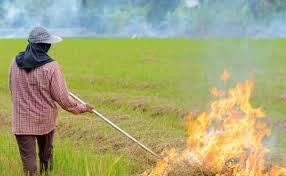The Thai government ordered a tougher crackdown on farmers violating a crop-burning ban after air pollution levels in Bangkok soared on Friday, a week after air pollution forced the closure of hundreds of schools.
Smoke from farmers burning crop stubble, combined with car and factory exhaust, has boosted air pollution in Bangkok and other cities in the first few months of the year.
On Friday morning, Thailand’s sprawling capital ranked seventh on air quality monitoring company IQAir’s list of the world’s most polluted cities.
Levels of PM2.5 pollutants, carcinogenic fine particles small enough to pass through the lungs into the bloodstream, have reached 86 micrograms per cubic meter, according to IQAir.
A reading above 15 in any 24-hour period is considered unhealthy by the World Health Organization.
High PM2.5 levels were also recorded in the northern cities of Chiang Mai and Udon Thani on Friday.
The government on Thursday ordered provincial authorities to enforce the stubble-burning ban and report the number of farmers they have arrested for violating the ban.
“Those who do not allow crop burning or take preventive measures in all provinces will be punished,” the Thai government said in a statement on Thursday.
More than 1.1 million protective masks have been distributed across the Kingdom and the Ministry of Health is keeping an eye on vulnerable groups such as children and pregnant women.
The government has also urged drivers to make sure their vehicles comply with emission standards.
Pollution levels are expected to spike from Friday to Wednesday as cool, stable weather conditions hinder the spread of pollutants.
Last week, Bangkok authorities closed more than 350 schools due to rising air pollution, but no such order was issued on Friday.
To reduce vehicle emissions, the city’s Skytrain, subway, and light rail services were free for a week. Recently, schools have also been closed due to air pollution in other parts of Asia, including Pakistan and India.
About 2 million students in the New Delhi area were forced to stay home in November after authorities ordered schools closed due to rising air pollution.




